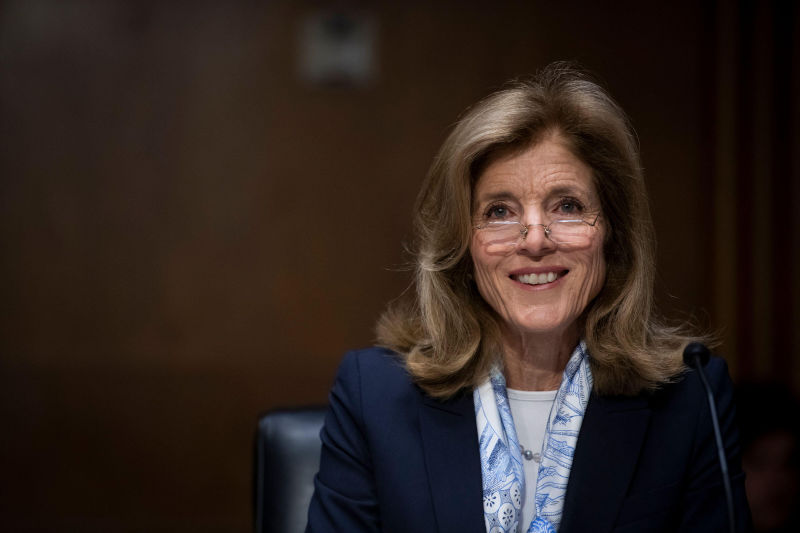Can Australia become a confident, independent country?
August 4, 2022
_Caroline Bouvier Kennedys arrival as Americas ambassador in Canberra has thrilled Australians who think of her as American royalty. However, her appointment is small comfort for those Australians concerned about the future of the countrys alliance with the USA.
_
It is increasingly worrying that there may be a Republican president in 2025. If this is not Trump himself, it will certainly be a neo-Trump. When this happens, Ms Kennedys replacement if there is one will only intensify concerns about the USA generally and the alliance with America in particular.
The United States Republican party is fast moving to the far right, furiously undermining Americas most important democratic institutions (the Congress and the Supreme Court), while systematically excluding many groups (First Americans, African Americans, Latinos, moderates, liberals and others) from the right to vote. It is committed to enacting illiberal laws such as halting a womans right to an abortion, with further, equally regressive legislation in the pipeline. The contemporary Republican party appears to be goose marching towards the fascist end of the political spectrum.
The febrile mob that attacked the Congress on 6 January 2021 is the tip of an alarming social and political iceberg that shows that the USA today is a deeply conflicted, violent, bitterly divided country. It is vastly different to the optimistic post-war great power with which Australia signed the ANZUS treaty back in 1951. Todays America is displaying many perhaps all of the symptoms of a great power in terminal decline. Like the collapse of the old USSR, Americas fall from its great power status is no longer a fantastical idea. A new civil war could well be in the making which would tear the country apart.
Nor is Australia the same country that it was back in 1951. No longer an outpost of what was once the British Empire, todays Australia is a multi-ethnic society that is slowly but surely coming to grips with the fact that its most auspicious geopolitical interests are situated squarely within the Asia-Pacific. Looming over this reality is the fact of Chinas rise as a great global power. Australias responses to this have so far been clumsily complacent and counterproductive based on the fiction that the USA is a reliable alliance partner.
Since the signing of the ANZUS treaty, Australian foreign policy has assumed that the country is respected as a middle power, regionally and globally. The concept of middle power in international politics is opaque at best, and mostly meaningless. Conventionally, it suggests that a state identifying itself as a middle power has the military and economic capabilities, cultural sophistication, a network of alliances, and a relatively large population that provide it with limited influence when dealing with bigger powers.
Given the restricted military capability that Australia possesses (for example, its mystical nuclear submarine fleet), that its economy is heavily reliant on resources exports (not manufacturing), that its hybrid culture is still evolving, and that its population is relatively small, the question is: Why should its middle power pretentions be taken seriously?
The only possible answer to this conundrum is that the alliance with the United States lends Australia a certain je ne sais quoi, a certain status in the Asia Pacific, and perhaps globally, by embedding Australia within the defence strategies of America. This myth has persisted in Australia for decades, leading to a culture of complacency in Australias defence planning. In short, Australias middle power fantasising about itself is based entirely on its security dependency on the USA.
This means that Australia is now largely defined by its self-satisfied diplomatic profile. This has been the case for decades, but it increased starkly during the foreign policy years of the Abbott-Turnbull-Morrison governments. Consider the out-on-a-limb provocations of China, the chaotic cancellation of the submarine contract with France, the laggard status of the country in international forums on climate change, our deteriorating international reputation on human rights (vide, Indigenous rights, the rights of asylum seekers), and our downward trajectory on Transparency Internationals corruption index.
Australias dependence on the USA is no longer a tenable basis for guaranteeing the countrys security if it ever was. As Hugh White and other perceptive analysts have shown, Chinas rise in the Asia Pacific has been in the face of Americas decline in the region a decline that was previously heralded by the defeats it has suffered in major wars, for example in Korea and Vietnam, and its most recent humiliating defeat in Afghanistan.
In the face of Americas decline, can Australia reimagine itself as a confident, independent, country? Yes, it can. Yes, it should.
First, disentangling Australia from the obligations of ANZUS will require finely tuned diplomatic courage and determination. We have seen this courage and determination before when John Curtin stood up to Churchill to demand that Australias troops and materiel be brought home from Europe. This was Australias assertion of independence from Britain in the face of a threat of a Japanese invasion following the collapse of Britain’s Singapore stronghold in 1942. Those circumstances are not dissimilar to those of today. The time is coming when the USA will be unwilling or unable (or both) to provide us with any real security guarantees. Standing up to America will become is becoming an absolute necessity.
Second, by coming to grips with the fact of Americas unreliability as an alliance partner, Australians will recognise that their countrys dependent middle power self-imagining is delusional. Therefore, our politicians, media commentators and public intellectuals must lead the country towards the positive realisation of what it means to be a genuinely independent country. If successful, as Malcolm Fraser explained: We would have a sense of motivation, a sense of purpose, a belief in the future of this country, a belief that the future rested in our hands (Dangerous Allies, p. 279).
Third, it is more imperative than ever for Australia to educate itself into Asia. Over more than two centuries the country has been in the grip of a tyranny of ignorance about Asia, reproducing a toxic culture of racism and xenophobia in the minds of many Australians, and resulting in the country becoming Asias awkward partner. Asian languages and studies should be central in all curricula in our schools and universities to free our young people from this tyranny of ignorance.
Fourth, For Australia to become recognised as a good regional and global citizen, a highly professional diplomatic corps is a fundamental necessity. Resourcing this necessity must become a budget priority of the highest order. Two steps need to be set in train: (i) the country must comprehensively upgrade its regional representation in Asia and the South Pacific; (ii) the country must establish a new network of global alliances with like-minded countries, starting with the Scandinavian states, Canada, France and Germany.
While Caroline Bouvier Kennedy is no doubt a charming and intelligent representative in Canberra for the Biden administration, neither she nor the current US president offer more than temporary respite from the doom and gloom overshadowing America, domestically and internationally. Australia cannot afford to be distracted from pursuing its own interests which are patently contrary to being America’s dependent middle power.

